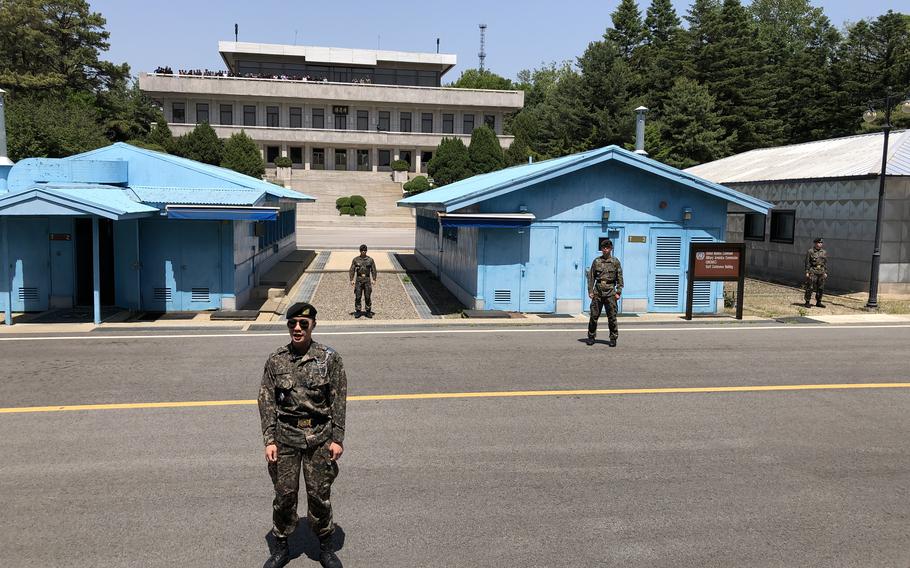
South Korean guards take positions at the Joint Security Area in the Korean Demilitarized Zone on May 29, 2019. (Joseph Ditzler/Stars and Stripes)
CAMP HUMPHREYS, South Korea — International troops guarding the south side of the border between North and South Korea are again permitted to carry firearms, a spokesman for United Nations Command said Wednesday.
U.N. Command, a multinational force led by the United States, several weeks ago reauthorized qualified service members to carry firearms at the Joint Security Area “to protect civilian and military personnel,” U.S. Army Col. Isaac Taylor, a spokesman for the command, told Stars and Stripes by text message.
He said the move comes in response to North Korea’s “current armed security posture.” North Korea rearmed its border guards last month after scrapping a 2018 agreement with South Korea aimed at defusing tensions on the Korean Peninsula.
The Joint Security Area is shared, neutral ground at the Demilitarized Zone where U.S., North and South Korean officials meet face-to-face. The roughly ½-mile-wide site containing the familiar blue buildings is guarded by U.N. Security Battalion personnel at all hours of the day.
“This action is being taken out of an abundance of caution, but [the command] has also informed the [South Korean] government and [Korean People’s Army] of its position that a disarmed [Joint Security Area] is safer and more peaceful for the Korean Peninsula ...,” the statement said.
Taylor provided no further details on the armed guards.
Starting in 2018, guards at the security area were prohibited from carrying firearms after the two Koreas agreed to confidence-building measures to lower tensions on the peninsula.
During their third summit on Sept. 19, 2018, North Korean Leader Kim Jong Un and then-South Korean President Moon Jae-in agreed to “completely cease all hostile acts against each other in every domain” and allow only up to 35 unarmed personnel from the two sides to guard the security area.
The Joint Security Area is a popular tourist destination but visits were suspended after U.S. Army Pvt. Travis King fled across the border there and into North Korea.
“The two sides agreed to expand the cessation of military hostilities in regions of confrontation, such as the DMZ, into the substantial removal of the danger of war across the entire Korean Peninsula …,” the two leaders said in a joint statement.
The peace agreement was partially suspended by South Korea on Nov. 22, a day after North Korea successfully put a military spy satellite into orbit.
South Korea’s military, which warned the North that the satellite test violated U.N. Security Council resolutions, said it would resume aerial reconnaissance operations that were previously banned under the peace agreement.
Seoul’s decision prompted Pyongyang to scrap the agreement entirely Nov. 23; the state-run Korean Central News Agency reported the North would no longer adhere to the accords and would redeploy armed troops to man guard posts at the border.
North Korea last fired an intercontinental ballistic missile on Monday, its fifth so far this year. The solid-fueled Hwasong-18 ICBM fired from the Pyongyang area flew over 622 miles at a peak altitude of 4,050 miles before splashing down in the East Sea, or Sea of Japan.